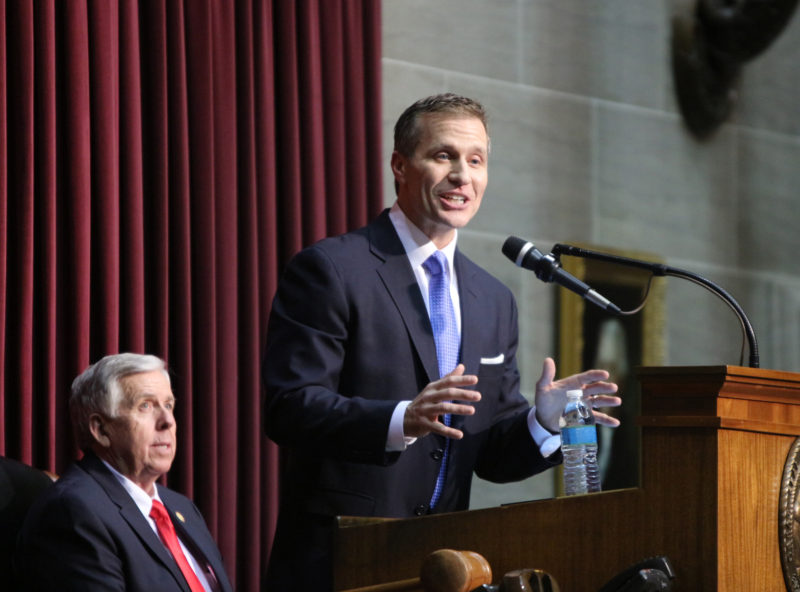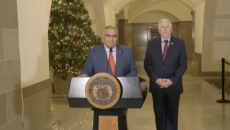By Benjamin Peters and Travis Zimpfer
JEFFERSON CITY, Mo. – Following a landslide victory in the November elections, the Missouri GOP took over every statewide office on the ballot. And now, 100 days after being sworn in, each Republican has since been tested in some way or another, each rising to the occasion to meet the challenges of their office.
The first 100 days has been marked by several noteworthy events, the first major challenge presenting itself in the form of severe winter weather earlier in the year. Gov. Eric Greitens quickly took command with his team, issuing a State of Emergency and working to prepare the state as much as possible. Through the state’s trials and tribulations, he has been seen front and center, working in the trenches alongside Missourians. But the other newly-elected members have also found ways to lend a helping hand; the new State Treasurer activated disaster relief programs to aid businesses and farms affected by severe weather in April.
During that same time, Missouri has seen their elected politicians deliver on some of their campaign promises, the most notable of which was the passage of right-to-work, a monumental testament to the new direction Republicans are leading the Show-Me State. The state also signed off on tort reform measures, continuing to signal a change in politics-as-usual and attempt to expand on their mission to create more jobs and spur growth in the state’s economy.
Each official has worked to find an efficiency to the inner workings of their offices amidst a nearly $500 million budget shortfall, while also finding ways to implement new policies as the state legislature continues to wrestle with Missouri’s $27.8 billion budget.
With Missouri’s conservative push continuing, the mission of each new statewide official has been simple: earning the opportunity they have been given by the voters. Here’s a look at how each official has fared so far:
Greitens’ first 100 days mirrors his campaign
When Eric Greitens, a former Navy SEAL, humanitarian and best-selling author, first announced he would run for governor as a Republican in north St. Louis in Sept. 2015, he vowed he would change the culture inside of Jefferson City, even pledging to throw corrupt lobbyists and legislators alike down the Capitol steps himself, if need be.
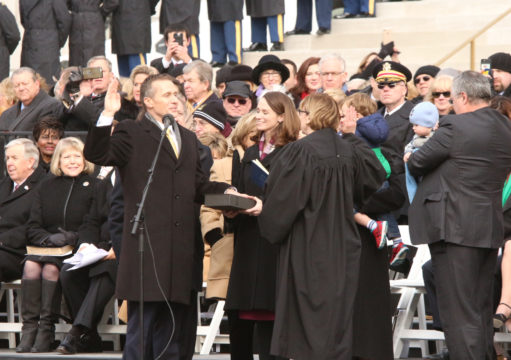 Few believed then, more than a year away from the general election, that Greitens, who had flirted with the idea of running for office as a Democrat as early as 2008, would become the next governor of Missouri. But after defeating former Attorney General Chris Koster, Greitens stood before the Capitol and became the 56th Governor of Missouri Jan.9, 2017.
Few believed then, more than a year away from the general election, that Greitens, who had flirted with the idea of running for office as a Democrat as early as 2008, would become the next governor of Missouri. But after defeating former Attorney General Chris Koster, Greitens stood before the Capitol and became the 56th Governor of Missouri Jan.9, 2017.
In many ways, Greitens has stuck to the promises and practices of his campaign, and while he has yet to accomplish some of the lofty goals he promised, he has actively attempted to meet the expectations he, and the people of Missouri, put on himself.
Still, the common criticisms of his campaign have lingered as he has taken office, as he still seems like a man who never stopped campaigning. He and his staff prefer to utilize a direct approach in interacting with the public, using Facebook live streams, videos, and Q and A’s (as opposed to press conferences) where questions can be asked and minutiae on his grasp of policy determined.
The governor’s best moments have also come at unexpected times in the face of nonpartisan trials where his rhetorical skills and ability to take action can make for inspiring moments. During his campaign, he put on waders and work gloves and placed sandbags during New Year’s flooding in Jefferson County. When vandals desecrated a Jewish cemetery in February, the first Jewish governor of the state worked to restore the damage and clean the site, with Vice President Mike Pence no less.
Policy-wise has been less explosive for the new governor. Greitens has wavered little from the Republican Party line despite his campaign brand as a “political outsider.” The first piece of legislation he signed in office was Sen. Dan Brown and Rep. Holly Rehder’s right-to-work bill, and he later signed Rep. Kevin Corlew’s Daubert expert witness standards bill, delivering on two key promises made during his campaign. The labor and tort reform measures are lockstep with traditional conservative policies meant to favor industry and business.
Greitens perhaps most aggressively pushed for ethics reform during his campaign, but no piece of ethics reform from the legislature has reached his desk yet, as the Senate still has yet to take up any significant action on the House’s bill on lobbyist gifts, the first item passed out of the House this session. However, in his first day of office, Greitens signed an executive order banning members of his administration from leaving the office and then lobbying to the executive branch, which he has urged the other bodies to do as well.
On the campaign trail, Greitens used his aggression to successfully dig at everyone from lobbyists to legislators and early in his term, he carried that same aggression into the governor’s office, which has arguably hurt more than helped his relationship with the body needed to get things done.
Greitens was heavily criticized for his approach to whipping votes on a measure that would reject a recommended state legislator pay increase, which was described by some on the Senate floor as active bullying. Greitens also unilaterally instituted a new paid family leave policy for some members of the executive branch, which concerned Senate President Pro Tem Ron Richard and other Republican leaders enough to stall the confirmation of multiple gubernatorial appointments.
Whether Greitens stands up to his own ethical standard placed on Jefferson City politics remains to be seen. Underlying sources of certain campaign contributions, like a $2 million donation from the SEALs for Truth PAC, still remain unknown. A political nonprofit called “A New Missouri, Inc.” has set up shop in Jefferson City specifically to support Greitens’ agenda – with the distinct capability of taking in unlimited donations with complete anonymity for their donors – serving, at the least, as a distinct distraction in the media from the new Governor’s work.
Greitens’ first 100 days continue to look a lot like his campaign – for good and bad – but his supporters have found little reason to complain, because Greitens has done so far in his first 100 days what he said he would do, with the possible exception of throwing lobbyists down the steps of the Capitol.
Parson’s new take as lieutenant governor
Meanwhile, Mike Parson is already looking to leave his own mark on the office of the lieutenant governor.
Held by Peter Kinder for three terms, the Lt. Governor’s office itself is the perfect example of the changes brought by the newly elected official. Following Kinder’s departure, the office underwent major makeovers, with Parson’s chambers reflecting the simple yet elegant style of the former state senator.
But perhaps the most noticeable change is how often Parson can be seen in the Senate, presiding over the proceedings. He can often be found sitting at the dais, gavel in hand, ready to reign in or direct the proceedings, which his experiences in the Senate truly primed him for. And it’s that unique hands-on approach that may just set him apart from predecessors. In fact, he may already have set a record for most appearances within the first 100 days.
Lt. Gov. Parson finds himself in the unique position of being the only elected official serving in both an executive and legislative capacity. Parson also serves on a number of boards and commissions, as commanded by state statute.
Lieutenant Governor Parson presided last night over a joint session of the MO Legislature for the Governor’s State of the State Address. pic.twitter.com/qi30AMWg1s
— Office of the Lt Gov (@MOLtGov) January 18, 2017
In that capacity, the Lt. Gov. has already cast votes as a member of the committees, echoing Missouri’s commitment to bringing jobs to the Show-Me State. In early March, he cast his first official votes as a member of the Missouri Development Finance Board, voting to approve two BUILD projects bringing new jobs to the Central Missouri region, which should lead to roughly 500 new jobs between American Outdoor Brands Corporation and Aurora Organic Dairy, which are expected to bring in millions in the coming years. Parson said it was made possible by making Missouri a right-to-work state. His office is also working with public and private sector entities on a “Buy Missouri” campaign to promote products made within the state.
One look at the @MOLtGov Twitter account can show you just what the Lt. Gov. has been up to: meeting with Missourians. His visibility to the public and accessibility has been noticed by many, whether it has been meeting with visitors to the State Capitol, attending Lincoln Day events, or taking part in ceremonies to honor those who sacrificed their lives in the service of the country. Parson was a vocal supporter of two resolutions in the Missouri House and Senate (HCR 35 & SCR 18) urging the Defense POW/MIA Accounting Agency to prioritize the cases of 15 Missouri soldiers who are still unaccounted for in Vietnam. Plans are also underway within the Lieutenant Governor’s Office for a kickoff to Veteran’s Week in November for all veterans, with special recognition given to World War II and Korea veterans.
And despite the changes, Parson has remained true to his roots as farmer and cattleman. In fact, this year, Parson was named the Missouri Cattlemens’ Association Cattleman of the Year. He still remains a strong advocate for agriculture, the state’s number one industry.
Parson also sponsored a resolution on agriculture that was adopted in March by the National Lieutenant Governors Conference in Washington, DC. The resolution stressed the importance of continued and expanded access to export markets for agriculture.
“Global exports of agricultural products generate over 20% of U.S. farm income, and it is very important for us to work with the federal government to lower trade barriers and strengthen the agricultural sector to promote overall economic growth,” Parson said.
With the amount of work the new Lieutenant Governor has already put into his office, it is safe to say there is a new sheriff in town.
Ashcroft and the fight to establish Voter ID
After 100 days in office, Secretary of State Jay Ashcroft’s top priority still remains to implement and educate the public in regards to the new voter ID law.
Missouri voters in November passed a measure that would require voters to show a photo identification card when going to the polls.
And with his landslide victory in the Secretary of State’s race, Ashcroft replaced Jason Kander, meaning a Republican would lead the charge to put the new law into effect.
The issue before Ashcroft and his team has been one of much debate for the first 100 days: what is the best way to get the word out to voters, and how much funding is needed to do so?
Kander had requested roughly $5.2 million over a two-year period to implement voter ID, but in a tight budget crunch year, Ashcroft’s plan calls for considerably less.
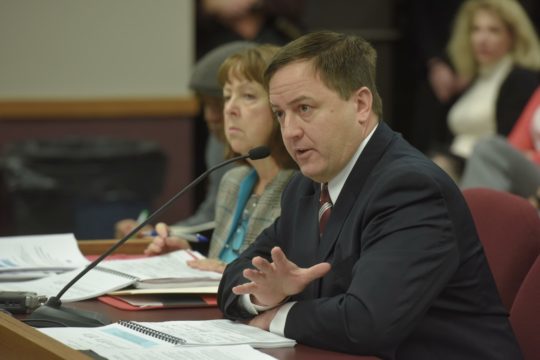
Under his plan, the Republican asked for $1.4 million, saying that by cutting television ads and direct mailings to the state’s registered voters, he could still accomplish the goals while saving money. Instead, his plan relies on personal interactions with Missouri voters and partnerships with community groups in order to spread the word.
Democrats have vehemently decried that number, saying the plan is inadequate and disingenuous, that it doesn’t show a real commitment to making sure every voter is reached.
But while finishing their work on the state’s budget, the House of Representatives surprised everyone when they called for another vote on a proposal by Rep. Peter Meredith, which sought to increase the amount of funding to be put toward voter ID. After voting it down the first time, the House returned to the item in question later, passing the measure to include roughly another $1.5 million to nearly double the funding for it.
While the legislature works to decide how much money will actually be given to the purpose, Ashcroft has already been working to get the message out about the new law before the upcoming August elections.
The Secretary of State announced his education initiative, called “Show It 2 Vote,” earlier in March during a press conference in St. Louis, in which he was joined by Rep .Bruce Franks and the bill’s sponsor, Rep. Justin Alferman. Franks opposes the law, but says he had agreed to work with the Secretary of State in developing a plan to educate voters, especially those whom Democrats say will be disenfranchised, namely the poor and minorities.
But the real public information campaign isn’t scheduled to begin until June 1, 2017, while the state budget goes into effect on July 1.
“We will work to develop public service announcements and advertising placement. We plan to run media advertisements weekly leading up to future elections and distribute posters and pamphlets to clearly articulate the new requirements. We will also notify every person that files as a candidate for office, making easy-to-understand information available to ensure their own supporters can satisfy the photo ID requirements,” Ashcroft wrote in an op-ed in early March.
In the meantime, Ashcroft has also continued his work in fighting for libraries throughout the state to ensure they receive the funding they need.
According to the Secretary of State’s office, in the 2017 Fiscal Year the Missouri State Library has approved a total of 96 grant applications in the amount of nearly $700,000 in federal awards to libraries throughout the state.
Meanwhile, the Securities division has been hard at work, actively investigating claims of abuse and fraud, with the creation of the new Vulnerable Citizens Services Unit will serve with a focus on preventing and reducing investor harm and paying particular attention to vulnerable citizens, including the elderly.
“It’s great to highlight the successes made in the first 100 days, but we are just getting started,” Ashcroft said. “Our next steps will include efforts to streamline business laws; review state-government imposed costs for businesses; implement photo voter ID; continue to write fair, accurate, concise ballot language; and bring common sense solutions to government. We will work diligently to ensure the office is both effective and efficient, trying to save every penny we can, while ensuring Missourians receive the top-notch service they deserve.”
Schmitt sets records as treasurer
The new state treasurer, Eric Schmitt, is already making waves of his own. The former senator has embraced the role as treasurer like a fish to water, already setting new records beyond being both the tallest senator – and now tallest treasurer – in Missouri’s almost 200-year history.
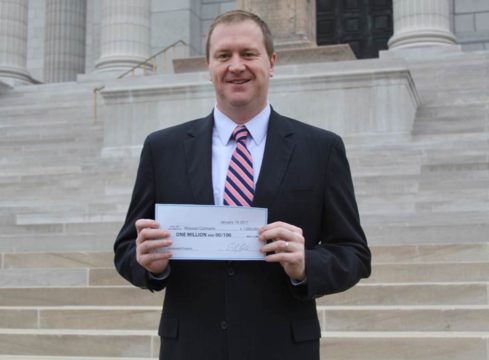
When it comes to unclaimed property, Missouri’s last treasurer, Clint Zweifel, was a pro. But Schmitt has shown a knack for the job, becoming the first treasurer in the history of the state to return $1 million in unclaimed property in his first 11 days in office. The previous record was 17 days. In all, his office has returned $12 million in unclaimed property and issued nearly two million payments and checks, while earning $7 million in interest on the state’s investment portfolio.
Schmitt’s goal is to streamline the process and make it more efficient than ever before, in hopes of cutting down the average processing time.
Schmitt has also been vocal about fixing Missouri’s pension system, saying that it threatens the state’s AAA credit rating. In February, the treasurer called on stakeholders to stop “kicking the can down the road and start working together to come up with long-term solutions to fix the problem of our insolvent public retirement system before it’s too late.”
He warned that if not acted upon soon, it could mean fewer resources for schools, roads and health services later on.
Schmitt has also been quick in efforts to provide relief to those affected by disaster, quickly approving programs to those affected by severe storms and flooding this spring.
But perhaps Schmitt’s biggest move is still yet to come: the treasurer is preparing to launch the Missouri Achieving a Better Life Experience (ABLE) program, which will allow individuals with disabilities or their families to create tax-advantaged savings accounts for expenses related to disabilities and special needs.
“I can tell you, as a father, these are the issues that keep me up at night, or that you wake up in the middle of the night and wonder what’s going to happen,” Schmitt said. “The piece of mind that this can give to families cannot be overstated. The security and independence that it can give to individuals living with disabilities cannot be overstated.”
That launch is scheduled for April 24th, and is what many are already calling Schmitt’s crowning achievement.
Higher office discussion already surrounds Hawley
The biggest question surrounding Hawley’s first 100 days in office is whether or not he’ll occupy that office in two-years-time.
That’s not to say he will be forced out the door by an angry mob. He’s not mired in controversy, and thus far, he has upheld the conservative ideology and rhetoric he campaigned upon. Voters have gotten what they voted for in Hawley, who won by the largest margin of any statewide candidate in November’s election – a margin larger President Donald Trump.
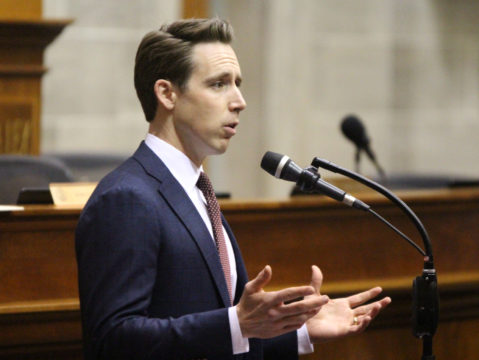
If anything, that popularity may propel him to higher office as many influential Republicans stated last week when they wrote a letter to Hawley, asking the young attorney general to run for U.S. Sen. Claire McCaskill’s seat. Former U.S. Sen. Jack Danforth and longtime officeholder and former Lt. Gov. Peter Kinder signed onto that letter, not to mention Republican mega-donor and the majority of the money behind the right-to-work effort, David Humphreys.
“I wish I could clone him,” former Sen. Jane Cunningham, one of the cosigners of the letter, said April 10. “If you just go to his characteristics, his intellectual capacity, exceptional academic background, his constitutional conservatism, his faith, and his popularity with voters, I think he’s the natural candidate.”
Hawley has announced initiatives aimed at combatting human trafficking in Missouri with the formation of a human trafficking task force, announced in a safe house for trafficking victims in St. Louis and accompanied by an editorial on CNN’s website. He also created a new ethics policy for the attorney general’s office which, among other stipulations, forbids AG staff from taking gifts from lobbyists or accepting campaign contributions from anyone under investigation by the AG office.
Outside of that work, he has also projected his views on everything from his support of Neil Gorsuch’s Supreme Court nomination to his requests to the Environmental Protection Agency to return more authority to state governments. Hawley was also among the many cheerleaders in Jefferson City when Trump dismantled the Obama administration’s Clean Water Plan.
“As we have long argued and as legal experts from across the political spectrum have recognized, these regulations are flatly unconstitutional,” Hawley said in late March. “We fought these job-killing regulations in court and soon they will be gone. Relief is on the way for Missouri families.”
However, even before the letter urged him to run was sent out, there was idle talk he might be a popular choice to represent Missouri in Washington. In many ways, Hawley’s actions over the last 100 days put him in the position to serve as a foil to McCaskill. McCaskill elected to join Democratic opposition to Gorsuch and to the new EPA head Scott Pruitt, seen by many liberals as someone less concerned with protecting the environment than repealing regulations against industry. Hawley also ran as an anti-establishment, outsider figure, and should he win a primary and face McCaskill, that would put him in sharp contrast with McCaskill, a veteran of Missouri politics since Hawley was just three years old.
The road thus far for Hawley has not been without its share of bumps, however, he was criticized early in his administration for not residing in Jefferson City as required by statute, instead, living in Ashland, about 20 miles north of the state capital instead. Even after saying he did not need to live in Jefferson City, he rented an apartment in the town. He has also been criticized for bringing in defense lawyers from the prestigious firm of Shook, Hardy, and Bacon in Kansas City – instead of using cheaper in-house counsel – over a Department of Corrections disability discrimination case even after his office had offered a settlement agreement.
Regardless, Hawley has stayed mum on what he plans to do in the future. He did not comment on the letter asking him to run, and even though he did not receive a ton of contributions in April, his campaign is still sitting on just over $1 million thanks to $1 million in donations from Humphreys and Humphreys’ sister, Sara Atkins, just before the new campaign contribution limits went into effect in December.
With that money, his ability to campaign and natural charisma, Hawley may be in prime position to usurp McCaskill.

